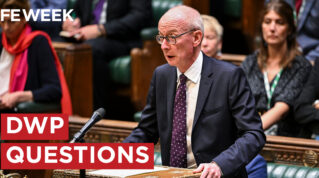The new government’s curriculum and qualifications review will launch a call for evidence in September, and 16 to 19 education will be included.
However, the review will not impact the current level 3 qualifications reform that involves defunding courses that “overlap” with T Levels, like BTECs, from 2025. This policy is being considered separately amid calls for a pause and review.
As revealed by FE Week’s sister publication Schools Week yesterday, Professor Becky Francis (pictured) will lead the curriculum review, starting as chair next month.
She will be supported by an expert panel, with a call for evidence launching in September. Results will be published in 2025. Here’s your FE Week round up of everything you need to know…
‘Broad, inclusive and innovate’ curriculum sought
The review will cover from key stage 1 through to key stage 5.
On 16 to 19 education specifically, a government press release said: “The review will look at ensuring all young people aged 16 to 19 have access to rigorous and high-value qualifications and training that will give them the skills they need to seize opportunity as well as ensuring they are ready for the changing workplace.”
The release included no mention of Labour’s pledge to “pause and review” current level 3 qualification reform, an issue which former prime minister Gordon Brown and T Levels architect Lord Sainsbury intervened on this week.
The Department for Education told FE Week the level 3 reforms will be considered separately.
The government’s press release said it wants a curriculum that “delivers excellent foundations in reading, writing and maths, and ensures every young person gets the opportunity to develop creative, digital, and speaking and listening skills particularly prized by employers”.
It will “build on the hard work of teachers who have brought their subjects alive with knowledge-rich teaching, to deliver a new national curriculum which is rich and broad, inclusive and innovative”.
The review will also look “closely at the key challenges” to youngsters’ attainment and the barriers that hold children back, in particular those who are socio-economically disadvantaged and those with special educational needs.
It will also look at whether the current assessment system “can be improved for both young people and staff, while protecting the important role of examinations”.
But ‘evolution not revolution’
However despite that, the government said the review will “seek evolution not revolution” as they recognize the “pressure schools and colleges are already under, and the further strain the wholesale reform can bring”.
They have pledged to be “alive to the trade-offs required to deliver high and rising standards alongside greater breadth – in particular any recommendations that would increase workload”.
Francis said: “I know how stretched schools, colleges and their staff are. So it’s particularly important to me to consider how any changes could contribute to staff workload and to avoid unintended consequences.
“Crucially, I want to make sure that the review and its recommendations are driven by evidence and a commitment to high standards for all our young people, irrespective of background.”
But one big change, already announced, is that academies will now have to follow the national curriculum up to age 16.
Expert panel, and sector views ‘vital’
Francis will lead the review as its chair. She will start on August 6.
Francis will also be supported by an expert group “made up of individuals with experience right throughout the education system”. They have yet to be appointed.
A government press release also said the views of experts, parents, teachers and leaders “will be pivotal to the recommendations”.
September launch and curriculum roadshows!
An official call for evidence will be launched in September. The review will also take written evidence from “key stakeholders”. Plus – there will be a “national roadshow” to meet and get input from staff “on the frontline”.
Findings next year, but could be 2026 before changes
The government would only say the review will publish recommendations “in 2025”. The Department for Education has not said when changes would be implemented.
But its own workload commitment is that any major curriculum changes should be brought in, where possible, at the start of an academic year – with a “lead in time of at least a year”.
If this was adhered to, it means any eventual changes might not be introduced until as late as September 2026 – more than two years away.
Phillipson: review will ‘breathe new life into outdated curriculum’
Education secretary Bridget Phillipson said this is an “important step in this government’s mission to break down barriers to opportunity, deliver better life chances and enable more young people to get on”.
The review will “breathe new life into our outdated curriculum and assessment system” which has “for too long … held back” children.
Former DfE adviser and tutoring chief to lead EEF
Francis will join the DfE on secondment to lead the review. The EEF’s directors of impact and research, Chris Paterson and Emily Yeomans respectively, will provide interim leadership as joint CEOs in her absence.
Paterson was formerly a policy adviser at the DfE, while Yeomans was a director of the National Tutoring Programme.
Dame Christine Gilbert, EEF chair, will “provide additional time and extra support” as “executive chair”.
Gilbert added: “A common thread running throughout Becky’s career has been a laser-like focus on addressing educational inequalities. I have no doubt that she will bring this commitment to the review.”















T-levels are failing everywhere and putting centres and lecturers under pressure. They do not represent high quality education. No one would be running the qualifications if they were not given handouts to support them. And colleges must take the money because they are all struggling.